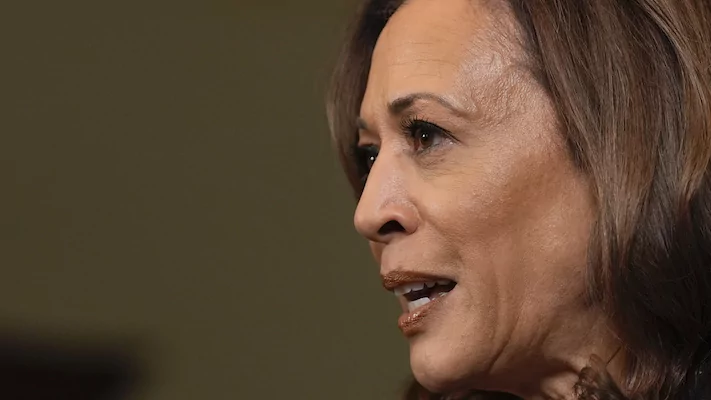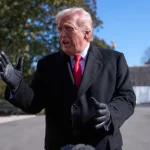

Strong gross domestic product numbers, slowing inflation, and a coming interest rate cut are all good news for Vice President Kamala Harris’s campaign as she seeks to convince voters she would be a strong steward of the economy.
President Joe Biden had been weighed down by poor economic approval ratings before he exited the race, and while Harris will undoubtedly be tied to Biden’s handling of the economy, the separation does give her a bit of wiggle room.
And fresh macroeconomic data since Harris became the presumptive Democratic nominee have been moving in the right direction for her political prospects. Inflation, while still high, is falling, GDP is increasing at a healthy clip, and the Federal Reserve is poised to cut interest rates.
“The macroeconomic numbers have been trending in the right direction and what you have now is a presumptive Democratic nominee who will be able to make the argument more effectively than President Biden,” Brian Marks, executive director of the University of New Haven’s Entrepreneurship and Innovation Program, told the Washington Examiner.
The biggest economic complaint from voters is inflation, which amounts to 19% cumulatively since Biden entered office. Annual inflation, or price growth measured from the preceding 12 months, peaked around 9% but has since fallen back to more manageable levels.
The Fed considers healthy inflation to be 2%. On Friday, the personal consumption expenditures index for June was released and showed inflation falling once again, though slightly, to 2.5%. Any decline is good news for Harris, especially after inflation became stagnant earlier this year and even moved up at times.
“Inflation had stalled out in the first four months of the year, and that delayed the timetable for the Fed to start cutting interest rates,” Greg McBride, chief financial analyst at Bankrate, told the Washington Examiner.
Still, Republicans are pointing out that the slowing inflation is too little too late and that former President Donald Trump would be much better for the economy. They also blame inflation itself on the fiscal and monetary stimulus under Biden. Republicans point to Trump’s first term in office, when the economy was strong and unemployment was low until the pandemic took hold.
Many people have already decided who they are going to vote for in the 2024 contest, so changes in macroeconomic data are unlikely to make them budge. Economic models suggest that relatively major swings in incoming data would be required to tip the election.
While inflation declining a bit more is not likely to tip the scales of many voters who are very dissatisfied with nearly four years of cumulative inflation, McBride noted that it does open the door for a preelection rate cut.
“Next week, the Fed does meet, and they’re not going to cut interest rates this time, but they will tee things up to be able to cut interest rates in September, provided the economic data continues to cooperate,” he said.
The Fed will hold two meetings before the election, one next week and one in September. The odds of the Fed cutting rates before the election are now about 88%, according to the CME Group’s FedWatch tool, which calculates the probability using futures contract prices for rates in the short-term market targeted by the Fed. That is up from just over 50% odds of a preelection rate cut a month ago.
In other good economic news, and good news for Harris, the economy expanded even more than analysts had expected in the second quarter of this year, which spanned from April to June.
The economy grew at a robust 2.8% seasonally adjusted annual rate in the second quarter of this year, the Bureau of Economic Analysis reported Thursday in a preliminary estimate. The consensus among economists was that GDP would increase at a 2% rate.
And while the report will be updated twice in the weeks ahead, the strong preliminary estimate is an indication that the economy has been humming right along. It is also a notable increase from the 1.4% growth in the first quarter.
“The economic growth for the second quarter surprised to upside, well exceeding expectations and a growth rate that was double what we had seen in the first quarter,” McBride said. “That number is going to get revised a couple more times, but it so far exceeded expectations that even revisions probably won’t take much bloom off the rose.”
Taken together, all of these things are good news for Harris, who is trying to differentiate herself from Biden, touting her time in office while working to avoid being pulled down by Biden’s low economic approval ratings.
Marks said he thinks Harris will be able to make the argument that inflation is meaningfully falling more effectively than Biden has been able to. Bidenworld briefly tried to brand positive economic developments as “Bidenomics,” but the rebrand didn’t appear to help his approval ratings and in some cases even backfired, with Republicans using Bidenomics as a pejorative.
“In this regard, with all the indicators, it will be positive news for her, and she will be more able to make the effective argument as opposed to a surrogate,” he said.
Republicans will undoubtedly work to paint Harris as a continuation of Biden and his economic policies. For instance, Sen. Rick Scott (R-FL) has already taken to pinning the inflation that voters have felt to the vice president.
CLICK HERE TO READ MORE FROM THE WASHINGTON EXAMINER
“Every day, the American Dream moves further out of reach, and hardworking Americans are feeling the consequences of the Harris Price Hikes everywhere — from the grocery store, to paying rent, to filling up their cars to get to work,” he said.
“The failures of Bidenomics and the pain caused by Harris Price Hikes mean small businesses are being forced to close, Americans are having to take on multiple jobs to make ends meet, and even seniors are coming out of retirement because they cannot afford to not work,” Scott added.




